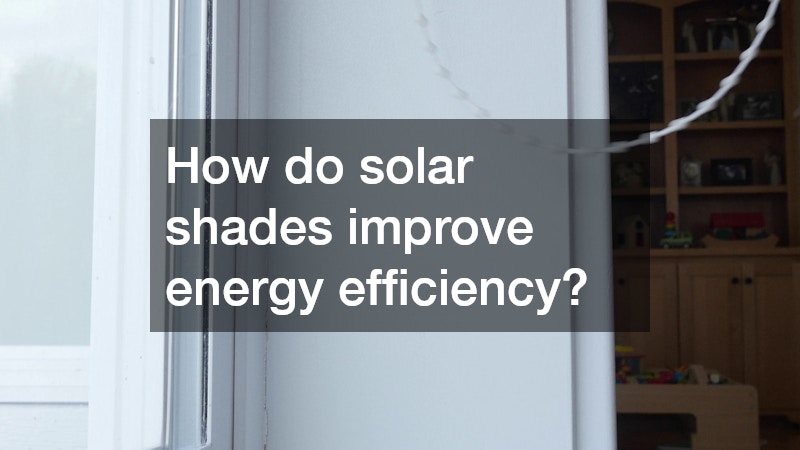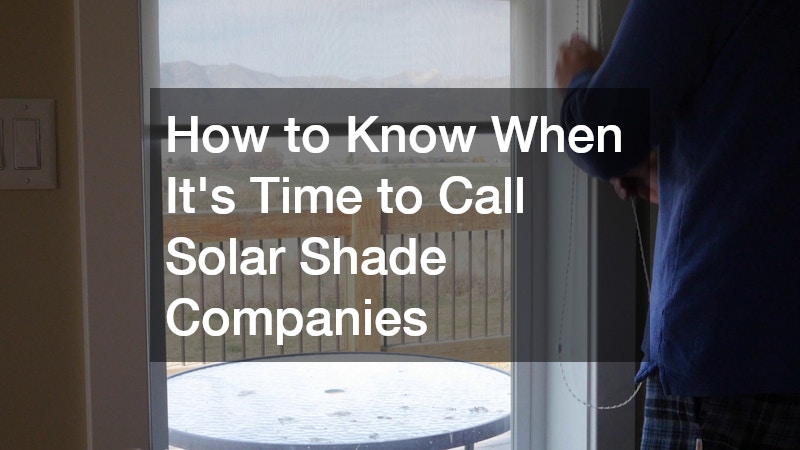Solar shades can be a transformative addition to any building, enhancing energy efficiency, comfort, and protection against UV rays. But how do you know when it’s time to consider installing them? This article explores key indicators and frequently asked questions to help you determine when to reach out to solar shade companies.
How do solar shades improve energy efficiency?
Solar shades utilize advanced fabric technology to reduce the amount of solar heat that enters a building. By blocking and reflecting significant portions of UV and infrared radiation, they contribute to reduced reliance on air conditioning systems.
As a result, buildings equipped with solar shades often experience a noticeable decrease in energy consumption.
The unique fabric of solar shades allows light to be filtered while maintaining outside views, which is particularly beneficial in office settings. This balance helps in utilizing natural light without the associated heat buildup, thus lessening the load on interior cooling systems. The integration of solar shades can lead to improved indoor comfort and energy efficiency.
Incorporating solar shades contributes to sustainable building practices by lowering CO2 emissions associated with energy usage. Reduction in energy demand not only benefits the environment but also results in considerable cost savings for building owners. The initial investment in solar shades is often recouped through these energy savings over time.
To determine the potential benefits of solar shades, start by evaluating the existing energy efficiency of your home or office. Conducting an energy audit can help identify areas where energy loss is most prevalent. This evaluation can uncover inefficiencies in windows that might benefit from additional shading.
Look for signs of energy inefficiency such as drafts around windows, rooms with varying temperatures, and high heating or cooling bills. These issues often indicate that the current windows and shading are insufficient in maintaining a consistent indoor temperature. Solar shades can mitigate these issues by providing an added layer of insulation.
What are the signs you need solar shades?
If certain areas of your building suffer from persistent heat and glare, solar shades could be a practical solution. Rooms with excessive sunlight can quickly become uncomfortable, leading to increased air conditioning use and energy consumption. Solar shades effectively minimize these issues by blocking and diffusing sunlight without obstructing views.
High-glare environments can also impact productivity and comfort in office settings, as computer screens become difficult to view. By reducing the intensity of direct sunlight, solar shades alleviate eye strain and improve indoor conditions. This improvement can foster a more pleasant and productive workplace environment.
Identifying areas that consistently battle heat and glare issues is a strong indicator that solar shades could be beneficial. Employing solar shades in these areas can establish a more balanced indoor climate, reducing the necessity for additional cooling measures. As a result, they play a dual role in enhancing comfort and conserving energy.
Excess UV exposure can lead to fading and deterioration of interior furnishings and flooring. If you’ve noticed color distortion or fading on carpets, curtains, or upholstered furniture, UV protective solar shades might be necessary. These shades filter UV rays, preserving the aesthetics and longevity of your interior decor.
Over time, the financial implications of replacing faded or damaged furnishings can add up, making solar shades an economically sensible option. Not only do these shades protect your interior investments, but they also maintain the aesthetic value and ambiance of your spaces. This protective quality enhances the appeal of investing in solar shades.
What should you consider before contacting solar shade companies?
Solar shade companies offer a variety of materials and opacities to cater to specific requirements and aesthetic preferences. Common options include PVC-coated polyester, fiberglass, and even eco-friendly organic materials. Determining the ideal shade depends on factors like desired light filtration, UV protection level, and indoor-outdoor visibility preference.
For example, a high-opacity shade might suit a room with severe glare issues, while a low-opacity option might be better for areas requiring softer light diffusion. Moreover, some solar shades boast advanced features, such as antimicrobial coatings or fire retardancy, enhancing their attractiveness for safety-conscious buyers. Expanding your understanding of these options can help tailor your shade choice to your unique needs.
Evaluate the stylistic compatibility of solar shades with your current decor, ensuring they seamlessly integrate into your interior design. Many brands offer custom sizing and coloring to match your architecture without interruption. This personalized approach ensures that form and function coexist harmoniously when selecting solar shades.
Determining when to call solar shade companies involves recognizing energy inefficiencies, increased utility costs, and the physical impact of sunlight inside your space. By understanding the benefits of solar shades, identifying key indicators, and evaluating installation options, you can make an informed decision that enhances your environment effectively and economically.




